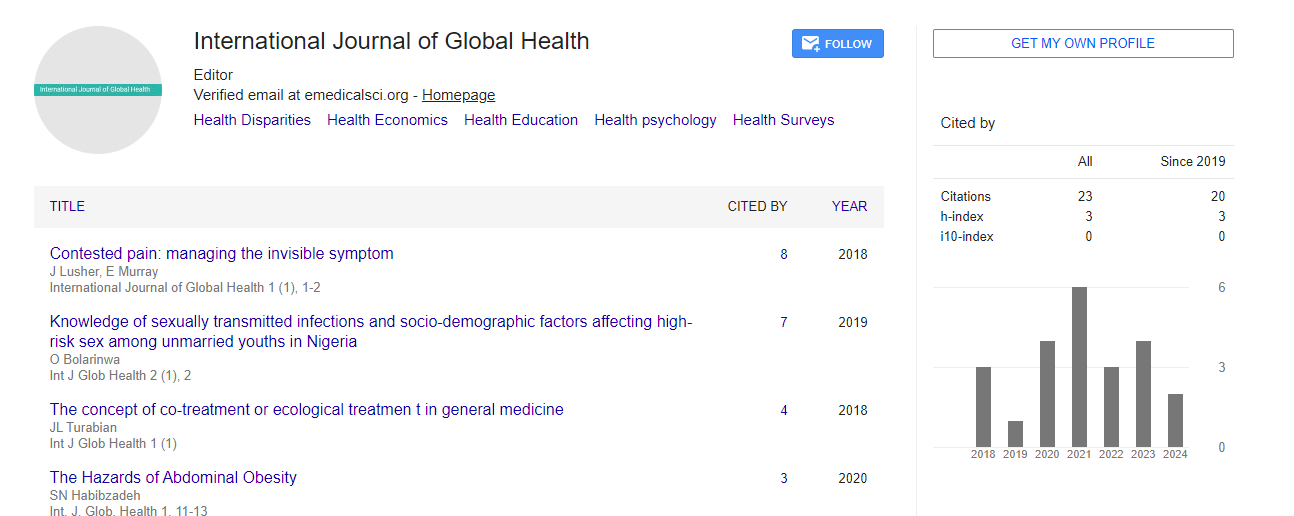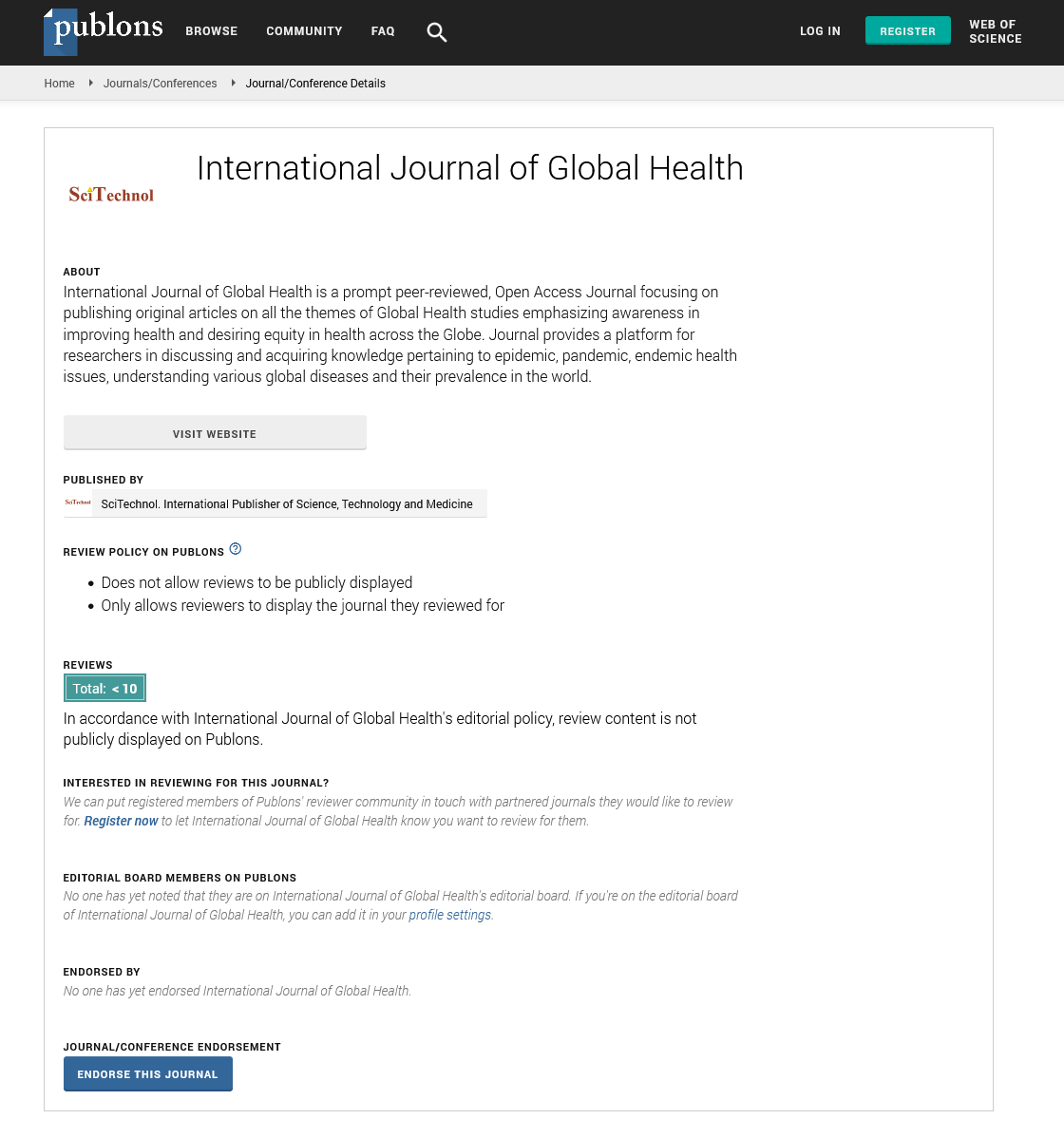Short Communication, Int J Glob Health Vol: 6 Issue: 1
Primary Care in the Prevention and Management of Common Mental Disorders
Toshihiro Otsuka*
1Department of General Medicine, Okayama University, Okayama, Japan
*Corresponding Author: Toshihiro Otsuka
Department of General Medicine,
Okayama University, Okayama, Japan
E-mail: otsukatoshihiro@gmail.com
Received date: 21 February, 2023, Manuscript No. IJGH-23-93597;
Editor assigned date: 23 February, 2023, PreQC No. IJGH-23-93597 (PQ);
Reviewed date: 09 March, 2023, QC No. IJGH-23-93597;
Revised date: 16 March, 2023, Manuscript No. IJGH-23-93597 (R);
Published date: 23 March, 2023, DOI: 10.4172/Ijgh.1000171
Citation: Otsuka T (2023) Primary Care in the Prevention and Management of Common Mental Disorders. Int J Glob Health 6:1 .
Description
The World Health Organization defines primary health care as "essential health care made available to individuals and families in the community through means acceptable to them, through their full participation, and at a cost that the community and the country can afford." It is an integral part of the country's health-care system, of which it is the nucleus, as well as the country's overall social and economic development.
Role of primary care
The case for primary care is made by contrasting the prevalence and burden of severe mental illness and common mental disorders with the relative availability of specialist services. In the Great Britain national psychiatric morbidity surveys of 1994 and 2000, for example, 16% of the adult population suffered from a common mental disorder such as depression and anxiety, and 0.5% from psychosis, with one psychiatrist per 50 000 in 1994 and approaching one per 10 000-20 000 population in 2005. As a result, no country, no matter how wealthy, can afford anything resembling sufficient specialist personnel to see and care for everyone suffering from a mental disorder [1-3].
Majority of people with them will need to be seen and cared for by members of a primary health-care unit. It is therefore critical that both mental health policy and general health sector reforms aim to strengthen primary health-care personnel's basic and ongoing training in assessment, diagnosis, management, and criteria for referral to secondary care. This is as important in developed countries as it is in low-income countries [4-6].
People with severe mental illnesses may be cared for by specialist services in richer countries, with some shared care with primary care for long-term support. In poorer countries, there may only be enough capacity to care for a small number of people with psychosis in specialist care, and the majority will need to be assessed, diagnosed, and treated in primary care, with assistance from specialist services [7].
Strengthening primary health care
Epidemiological studies show that common mental disorders are common in the general population, and they can be severe, disabling, and long-lasting. Because of the high prevalence in all countries, even wealthy countries cannot afford enough specialists to care for everyone suffering from a mental disorder.
It is not tenable to argue that the burden of common mental disorders should be ignored due to their high socioeconomic costs. These costs result from repeated primary care consultations, as well as untreated patients' absence, labour turnover, reduced productivity, and the impact on families and children. Primary care must thus play a central role in overall mental health care in both rich and poor countries. Primary care has particular advantages in that it allows attention to both physical health and social needs, it allows continuity of care, it is often preferred by consumers, it is often more accessible than specialist care, and studies have shown that good clinical and social outcomes are possible [8-11].
It is essential to examine the existing primary care system, its staffing, its system of basic and continuing training for each of the professional groups involved, and the existing system of information collection from primary care when developing policy on primary care for mental illness.
References
- Hartig T, Mitchell R, Vries S, Frumkin H (2014) Nature and health. Annu Rev Public Health. 35: 207-228.
[Crossref] [Google Scholar] [Indexed]
- Lerner H, Berg C (2017) A comparison of three holistic approaches to health: one health, EcoHealth, and planetary health. Front Vet Sci 4: 163.
[Crossref] [Google Scholar] [Indexed]
- Keune H, Flandroy L, Thys S, De Regge N, Mori M, et al. (2017) The need for European OneHealth/EcoHealth networks. Arch Public Health 75: 64.
- Baum F, Freeman T, Lawless A, Labonte R, Sanders D (2017) What is the difference between comprehensive and selective primary health care? Evidence from a five-year longitudinal realist case study in South Australia. BMJ Open 7: e015271.
[Crossref] [Google Scholar] [Indexed]
- Croteau K, Schofield G, McLean G (2006) Physical activity advice in the primary care setting: results of a population study in New Zealand. Aust N Z J Public Health 30: 262-267.
[Crossref] [Google Scholar] [Indexed]
- Annerstedt M, Währborg P (2011) Nature-assisted therapy: Systematic review of controlled and observational studies. Scand J Public Health 39: 371-88.
[Crossref] [Google Scholar] [Indexed]
- Estabrooks PA, Glasgow RE (2006) Translating effective clinic-based physical activity interventions into practice. Am J Prev Med 31: S45-56
[Crossref] [Google Scholar] [Indexed]
- Efferth T, Kaina B (2011) Toxicities by herbal medicines with emphasis to traditional Chinese medicine. Curr Drug Metab 12: 989-996.
[Crossref] [Google Scholar] [Indexed]
- Maroyi A (2013) Traditional use of medicinal plants in south-central Zimbabwe: review and perspectives. J Ethnobiol Ethnomed 9: 31.
[Crossref] [Google Scholar] [Indexed]
- Shil S, Dutta Choudhury M, Das S (2014) Indigenous knowledge of medicinal plants used by the Reang tribe of Tripura state of India. J Ethnopharmacol 152: 135-41.
[Crossref] [Google Scholar] [Indexed]
- Dalziel K, Segal L, Elley CR (2006) Cost utility analysis of physical activity counselling in general practice. Aust N Z J Public Health 30: 57-63.
[Crossref] [Google Scholar] [Indexed]
 Spanish
Spanish  Chinese
Chinese  Russian
Russian  German
German  French
French  Japanese
Japanese  Portuguese
Portuguese  Hindi
Hindi 
